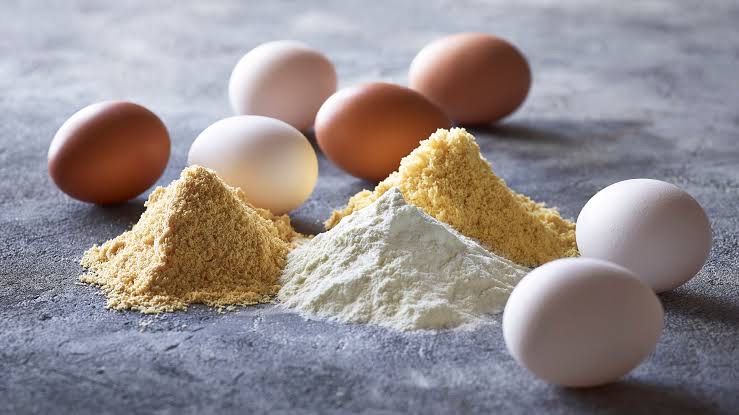Egg Powder Manufacturing Process
Egg powder is a versatile and nutritious product that has gained popularity in various industries, from food processing to pharmaceuticals. In this blog post, we’ll explore the process of egg powder manufacturing, its benefits, and the setup of an egg powder plant.
What is Egg Powder?
Egg powder is made from fresh eggs that are processed and dried into a fine powder. It retains the nutritional benefits of fresh eggs, including high protein content, vitamins, and minerals. Egg powder is used in a variety of products such as baked goods, pasta, sauces, and even cosmetics. The process of converting eggs into powder form helps in extending their shelf life and making them more convenient to use in various applications.
Check out our full range of services, information and cost of setting up egg powder plants by visiting our website.
Benefits of Egg Powder
Long Shelf Life
Unlike fresh eggs, egg powder can be stored for extended periods without refrigeration. This makes it an ideal ingredient for regions with limited access to refrigeration or for use in emergency food supplies.
Convenience
Egg powder is easy to transport and use in various recipes. It eliminates the need for cracking and separating eggs, reducing preparation time and mess in the kitchen. This convenience is particularly beneficial for large-scale food manufacturers and bakeries.
Nutritional Value
Egg powder retains the essential nutrients found in fresh eggs, including proteins, vitamins, and minerals. It is a rich source of high-quality protein, which is essential for muscle building and repair. Additionally, egg powder contains important vitamins such as B12, riboflavin, and folate, as well as minerals like iron and selenium.
Versatility
Egg powder can be used in a wide range of food products and industrial applications. It is commonly used in baking, where it provides structure and moisture to cakes, cookies, and bread. In the food industry, egg powder is used in the production of pasta, mayonnaise, and salad dressings. It is also used in the pharmaceutical and cosmetic industries for its binding and emulsifying properties.
The Egg Powder Manufacturing Process
The process of manufacturing egg powder involves several steps to ensure the final product is safe, high-quality, and retains its nutritional value. Here’s a detailed overview:
Egg Collection and Cleaning
Fresh eggs are collected from farms and transported to the processing facility. Upon arrival, the eggs are thoroughly cleaned to remove any dirt or contaminants. This step is crucial to ensure the safety and quality of the final product.
Breaking and Separation
The eggs are broken, and the egg whites and yolks are separated if needed. For whole egg powder, this step is skipped. The separation process can be done manually or using automated machines that ensure precision and efficiency.
Filtering
The egg mixture is filtered to remove any remaining shell fragments and impurities. This step ensures that the final product is smooth and free from any unwanted particles.
Pasteurization
The filtered egg mixture is pasteurized to kill any harmful bacteria. This is done by heating the mixture to a specific temperature for a set period. Pasteurization is a critical step in ensuring the safety of the egg powder, as it eliminates the risk of foodborne illnesses.
Drying
The pasteurized egg mixture is then spray-dried. This involves spraying the liquid into a hot chamber where the water evaporates, leaving behind a fine powder. Spray drying is an efficient method that preserves the nutritional content and quality of the eggs.
Packaging
The dried egg powder is collected and packaged in airtight containers to maintain its quality and shelf life. Proper packaging is essential to protect the egg powder from moisture, light, and air, which can degrade its quality over time.
Setting Up an Egg Powder Plant
Setting up an egg powder manufacturing plant involves several key considerations:
Location
Choose a location with easy access to fresh eggs and good transportation links. Proximity to egg farms can reduce transportation costs and ensure a steady supply of raw materials.
Equipment
Invest in high-quality equipment for cleaning, breaking, pasteurizing, and drying eggs. This includes egg breakers, pasteurizers, spray dryers, and packaging machines. Advanced equipment can improve efficiency and product quality, making your plant more competitive in the market.
Regulations
Ensure compliance with local food safety and manufacturing regulations. This includes obtaining necessary permits and certifications, as well as adhering to hygiene and safety standards. Regular inspections and audits can help maintain compliance and build trust with customers.
Quality Control
Implement strict quality control measures to ensure the final product is safe and meets industry standards. This includes regular testing of raw materials and finished products, as well as monitoring the production process for any deviations. Quality control is essential for maintaining the reputation and reliability of your egg powder.
Staff Training
Train staff on the proper handling and processing of eggs to maintain hygiene and quality. Well-trained employees can help prevent contamination and ensure that the manufacturing process runs smoothly. Continuous training and development can also improve efficiency and productivity.
Conclusion
Egg powder manufacturing is a growing industry with numerous applications and benefits. By understanding the manufacturing process and setting up a well-equipped plant, you can produce high-quality egg powder that meets market demands. With its long shelf life, convenience, and nutritional value, egg powder is a valuable ingredient in many food and industrial products.






Comments